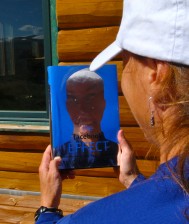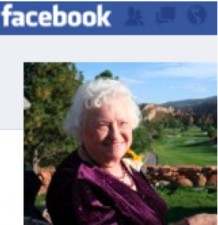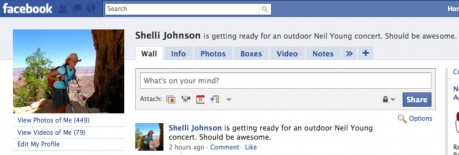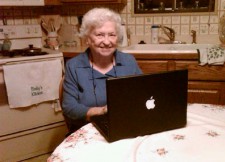Disclaimer: I LOVE Facebook. I just finished reading The Facebook Effect, by David Kirkpatrick, a veteran technology reporter who was for many years editor for technology and the internet at Fortune magazine. The book is phenomenal. In fact, for me it was a page-turner.

Kirkpatrick provides readers with a pretty up-close and personal view into the mind and life of Facebook founder/CEO Mark Zuckerberg, and provides a history of the most popular social network in the world, and the second-most visited site on the web.
Kirkpatrick writes near the beginning of the book: The Facebook Effect happens when the service puts people in touch with each other, often unexpectedly, about a common experience, interest, problem, or cause. This can happen at a small or large scale – from a group of two or three friends or a family, to millions…
Facebook is loaded with content that is generated constantly by its users. According to the book, each month, about 20 billion pieces of content are posted to Facebook by its users, including links, photos and stories. Kirkpatrick writes that company insiders estimate status updates alone that are made to Facebook amount to more than 10 times more words than all blogs worldwide. Facebook, not Flickr, is the largest photo sharing site right now. (According to Kirkpatrick’s book, by late 2009, Facebook was hosting 30 billion photos.)
We are also spending increasing amounts of our time on Facebook. Kirkpatrick writes that the Compete research firm reports than in January 2010, 11.6 percent of all online time in the U. S. was spent on Facebook, compared to 4.1 percent for Google. If these stats aren’t staggering enough, consider that more than 20 percent of the one billion internet users in the world use Facebook. Regularly. Specifically, Kirkpatrick reports that users spend 8 billion minutes every day on Facebook. (The average user spends about an hour each day on the social network.)

In other words, everybody’s doing it. Hell-fire, even my 86-year-old Grandma, in Colorado, is on Facebook! :>
- Here are some things I got from the book that I deemed valuable enough to highlight:
• Given the aforementioned data, it’s clear Facebook hosts an astounding amount of valuable content of all forms. Interestingly, as Kirkpatrick writes in The Facebook Effect, Zuckerberg acknowledges this is not Facebook’s content. Rather, it’s the users’ content. Facebook just happens to be the platform on which we are able to contribute and share such content.
• Facebook operates in 75 languages, and 75 percent of Facebook’s users are outside of the U. S.
• Naysayers and those who may still be resisting Facebook often criticize Facebook for the many status updates that are simply reporting of small or trifling matters. Zuckerberg’s standard rebuttal to this, according to Kirkpatrick and the book, is: “Understanding people is not a waste of time.” Zuckerberg’s goal is “to help people understand the world around them.”
• Zuckerberg often refers to the “social graph,” meaning the web of relationships formed via friendship connected in the social network. That’s what Facebook aspires to be. Kirkpatrick writes that Facebook’s CEO/founder believes that the “core value of Facebook is in the set of friend connections.” He says Facebook has “the most powerful distribution mechanism that’s been created in a generation.”
• I’ve long described Facebook as being a vehicle for word of mouth that has scalability. Word of mouth has always been the most effective form of marketing. Now word of mouth isn’t limited to words. It’s also videos and photos. And the size of our networks are no longer limited by the number of colleagues we work with or friends we physically hang out with. As Kirkpatrick writes, Zuckerberg’s colleague at Facebook, Matt Cohler, described this as the “mechanism for distribution was the relationships between people.”
• On the subject of identity, Kirkpatrick writes that Zuckerberg designed Facebook so that each person has only one identity. Kirkpatrick writes that Zuckerberg said: “The days of you having a different image for your work friends or co-workers and for the other people you know are probably coming to an end pretty quickly.” Kirkpatrick writes that Zuckerberg argues that having two identities demonstrates a lack of integrity, and that “the level of transparency the world has now won’t support having two identities for a person.”
• Facebook has taken hits by actions related to changing its terms of service and privacy settings. But Kirkpatrick writes that in fact Zuckerberg says that privacy has not only not disappeared, “but become even easier to control — what I want to share I can share with everyone. What I want to keep private stays in my head.”
• Another form of new distribution for Facebook platform has come in the way of applications. Applications on Facebook now have a unique way of acquiring new users, which further expands Facebook’s reach and user base.
• Kirkpatrick writes an interesting segment while discussing Facebook COO Sheryl Sandberg’s series of sessions with Facebook management to discuss strategy about the advertising opportunity. Kirkpatrick writes about how Facebook management differentiates Google and Facebook, and this section of the book provides key insights about what will surely be the future of advertising. When you search on something in Google, it presents you an ad that is a response to the world you typed into the search box… The ads you typically click on there are the ones that respond to what you already know you’re looking for. In advertising-speak, Google’s AdWords search advertising “fulfills demand.” Facebook’s, by contrast, would generate demand, the group concluded. Kirkpatrick writes that Sandberg’s researchers discovered that only 20 percent, at most, of the world’s $600 billion in annual advertising spending is spent on ads aimed at people who already know what they want. The remaining 80 percent, or $480 billion a year, was up for grabs as more and more ad spending shifted to the internet.
• Zuckerberg is not an enthusiast for advertising. In fact, his first priority at Facebook is to grow it, then to generate revenue. Kirkpatrick writes that Zuckerberg feels “The basic idea is that ads should be content…”
• Facebook contains the most targeted marketing potential of any medium in history due to the wealth of data is generates. Kirkpatrick writes that Josh James, CEO of Omniture, a major internet ad-targeted service, says “Facebook has the richest data set by a mile…It is the first place where consumers have ever said, ‘Here’s who I am and it’s okay for you to use it.'”
• Kirkpatrick says of traditional media organizations: if they are to most benefit from the Facebook environment they have to learn to function within it as if they were individuals. The playing field has been leveled by the site’s neutral way of treating all messages as similar. Any media company, newspaper or TV station can create it own page on Facebook. But then it faces the same mandate to generate interesting, relevant, and useful messages that an individual does.
• Facebook founder Zuckerberg wishes for a more transparent world. Kirkpatrick writes that one night over dinner with Zuckerberg, he asked the CEO about Facebook’s effects on society, including politics, culture, government, media and business. Zuckerberg responded by talking about the potlatch, which is a traditional celebration of indigenous people in the Pacific Northwest Coast. Each celebrant contributes what food and goods they can, and anyone takes what they want. The highest status goes to those who give the most away.
“Are you familiar with the concept of a gift economy?” Zuckerberg asks. “It’s an interesting alternative to the market economy in a lot of less developed cultures. I’ll contribute something and give it to someone, and then out of obligation or generosity that person will give something back to me. The whole culture works on this framework of mutual giving. The thing that binds those communities together and makes the potlatch work is the fact that the community is small enough that people can see each other’s contributions…”
Zuckerberg says Facebook and other forces on the Internet now create sufficient transparency for gift economies to operate at a large scale. “When there’s more openness, with everyone being able to express their opinion very quickly, more of the economy starts to operate like a gift economy. It puts the onus on companies and organizations to be more good, and more trustworthy.”
“… A more transparent world creates a better-governed world and a fairer world.” This is, for him, a core belief.
• Peter Thiel, who co-founded PayPal and is a well-known entrepreneur and venture capitalist who is viewed by many as a financial genius, was an early investor in Facebook, and is among its board of directors. Thiel has offered expertise and advice to Zuckerberg and Facebook. In a chapter toward the end, called “The Future,” Kirkpatrick shares with us more differentiation between Google and Facebook when considering the future of the two iconic companies. “Google in many ways is an incredible company with an incredible founding vision,” says Thiel. “But a very profound difference is, I think, at its core Google believes that at the end of this globalization process the world will be centered on computers, and computers will be doing everything. That is probably one of the reasons Google has missed the boat on the social networking phenomenon. I don’t want to denigrate Google. The Google model is that information, organizing the world’s information, is the most important thing.
“The Facebook model is radically different. One of the things that is critical about good globalization in my mind is that in some sense humans maintain mastery over technology, rather than the other way around. The value of the company economically, politically, culturally – whatever – stems from the idea that people are the most important thing. Helping the world’s people self-organize is the most important thing.”
The Facebook Effect is fascinating and insightful. The way we communicate and share and document our lives as a people is dramatically changing, in very large part due to Facebook. Reading the story behind Facebook and its brief-but-significant-history is not only exciting, but important.
-
LINKS:
Buy the book.
Become a fan of The Facebook Effect.
Follow the author, David Kirkpatrick, on Twitter.
NOTE: I received permission from author David Kirkpatrick to excerpt portions of the book.

